Lecturers' Experience
Online Teaching and Learning is a Unique Experience
With the Movement Control Order (MCO) is being enforced from 18 March to 28 April 2020, educators and students transitioned into the world of e-learning with great speed, reaping its benefits while ensuring that teaching and learning continue for both staff and students during this interruption to the current semester due to the Covid-19 pandemic. UTAR undergraduates and lecturers are finding out that learning as well as teaching from the comfort of their respective homes via e-learning during the Movement Control Order period can be a unique experience.
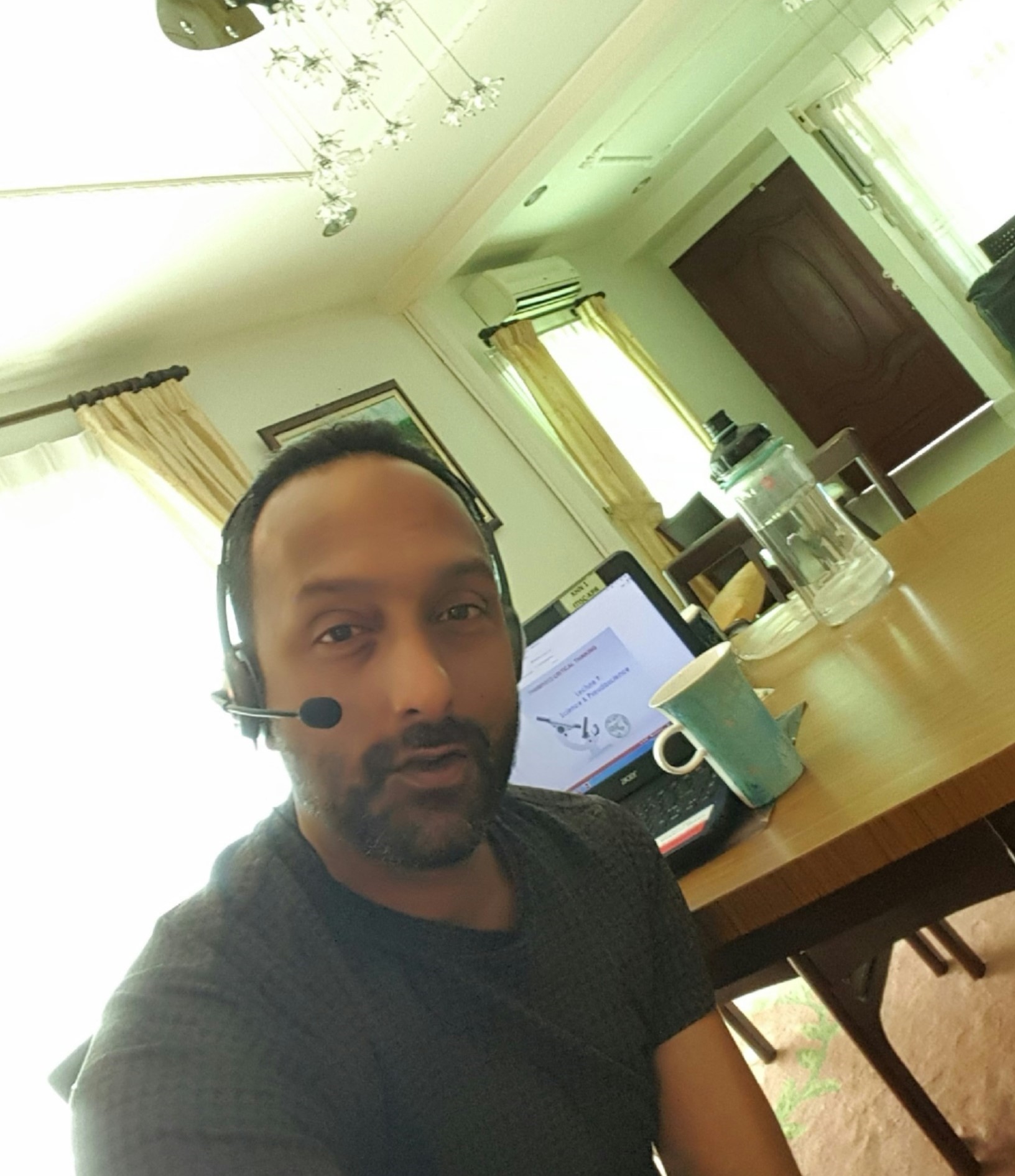
Lionel Keith Vytialingam
Department of Arts and Social Science
Centre of Foundation Studies (Kampar Campus)
Kudos to my students for being so supportive
Lionel feels glad that most of his students have been more supportive and responsive than he can ever have imagined. “I would say the biggest challenge of online teaching and learning is ensuring that all my students have equal access to my web-based learning material”, said Lionel Keith Vytialingam from the UTAR Department of Arts and Social Science, Centre of Foundation Studies (Kampar Campus). While he feels that most of his students are coping reasonably well, there are also those with limited access to data or Wi-Fi and limited access to computers. Lionel called it a challenge because there has not been a blanket or overarching solution to these difficulties.
Lionel said he wake up at 3 or 4 am to get online to “meet” some students whose internet access is best in the wee hours of the morning. He also compiles whatsapp voice notes into folders to be sent out for some who had difficulty accessing power point voice-over files on their phones, and even calling up students who had limited access to the internet or computers over the phone for one-on-one phone lectures. All this efforts is to ensure that everyone gets to move forward with lessons and exercises.
Lionel feels glad that most of his students have been more supportive and responsive than he can ever have imagined. Some of these students were the quietest in his traditional classrooms, the most passive, the most likely to doze off, but right now, he seeing an entirely different side to them. They not only try harder to ensure they understand the content, but they engage so much more actively in group discussions and online debates. Some have even told him that they now feel so much less “shy” or “afraid” to interact in English while engaging in online discussions and debates. These were some of the most reluctant students when it came to expressing ideas in class. These were students he used to urge to “try” to not be afraid to speak up in class, to “not care” how good or bad they thought their English was. As an English educator, this response from students helps Mr Lionel sleep better at night even during this MCO.
E-learning gives students better control over their own learning progress
Dr Abdelhak said E-learning is a great method of teaching and learning especially for part-time students. “E-learning is a great method of teaching and learning especially for part-time students. I am teaching Managerial Economics where most of my students are working. This gives them more flexibility and they can manage their time more efficiently. From my experience in online teaching I can ascertain that e-learning is a good substitute to traditional learning. Students are able to learn more by reviewing video lectures until they understand the lecture”, said Dr Abdelhak Senadjki from the UTAR Department of Economics, Faculty of Business and Finance.
Dr Abdelhak commented that E-learning provides students with better control over their own learning within a period of time. For those students who learn faster can get more work done while those who need more time can review the lectures several times. Students are more engaged by asking plenty of questions after the online class. “I see myself as a facilitator rather than just a teacher. I want my students to feel comfortable and feel connected in the online environment”, added Dr Abdelhak.
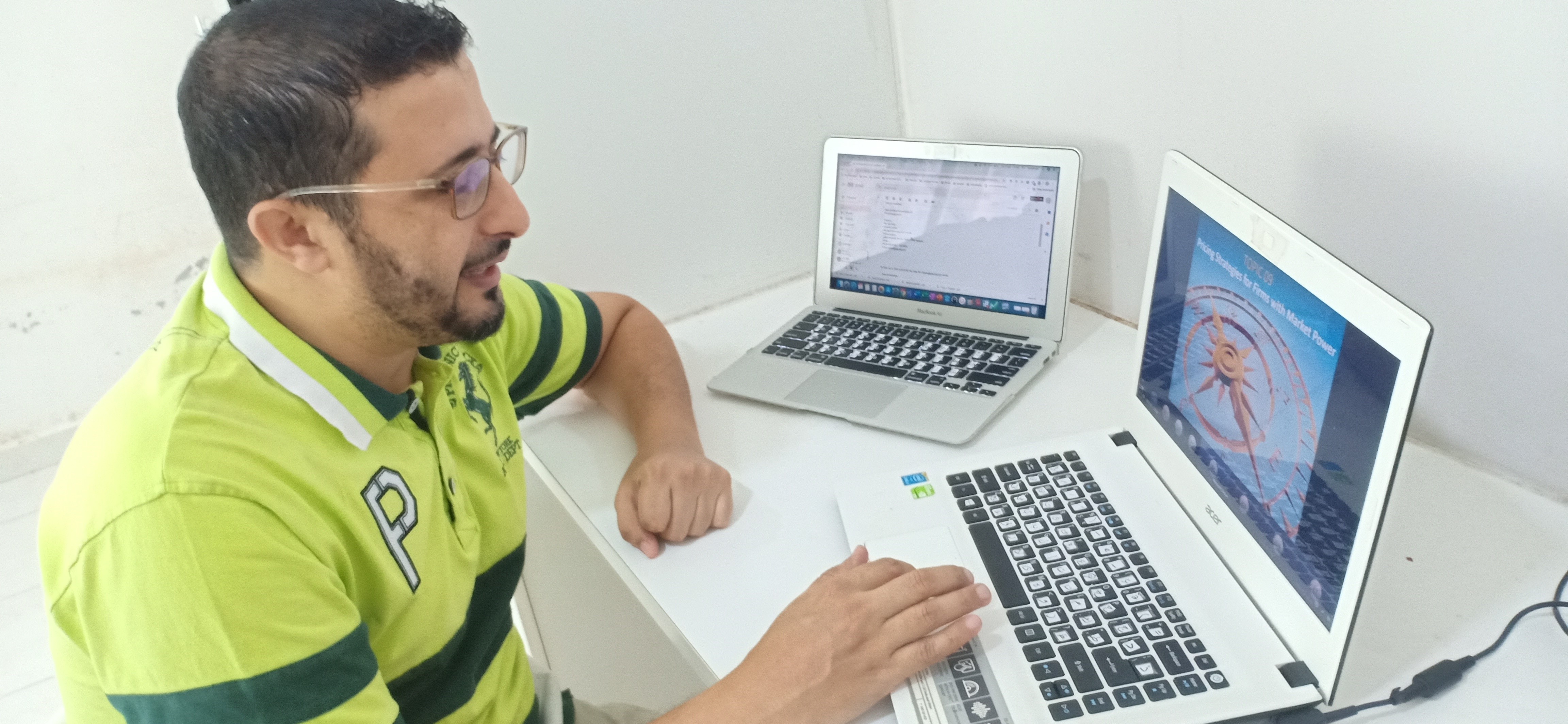
Dr Abdelhak Senadjki
Department of Economics
Faculty of Business and Finance (Kampar Campus)
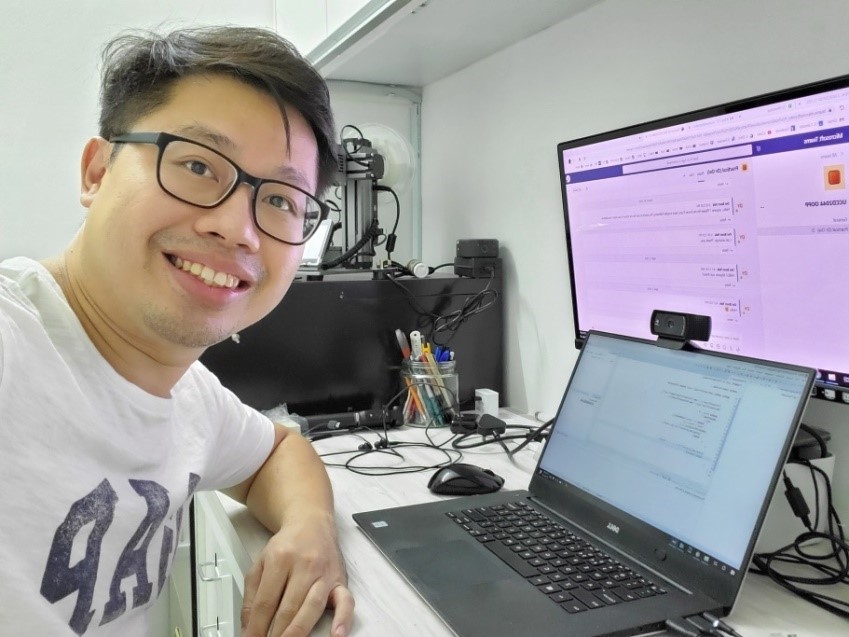
Dr Ooi Boon Yaik
Department of Computer Science
Faculty of Information and Communication Technology (Kampar Campus)
Online learning and teaching enhance students’ learning experience
Dr Ooi looks forward to incorporating the online teaching experience into his conventional classroom after the MCO. “When I first started my online teaching, I had no clue at all if my students would understand me and I was worried because I could not see their facial expressions during my lectures. I usually gauge their responses during lectures by looking at their faces and I would pace my lectures accordingly. However, with online teaching I wasn’t sure initially if I could engage them in my class,” commented Dr Ooi Boon Yaik from the UTAR Department of Computer Science, Faculty of Information and Communication Technology.
“However, my perception changed once the online classes started. I was very happy to see my students asking questions and communicating with me online, more than my usual lectures in class. They were very responsive. Perhaps it is the relaxing environments at home that made them less inhibited and ask more questions. Students, I feel are very comfortable in front of their computers at home than sitting in the classroom and therefore, they are bolder in asking questions using text chat. This is a good thing.”
Dr Ooi found that video lectures are a good way to allow students to study at their own pace. In physical programming classes, there will be space and time constraints as there are just too many steps and points that a student needs to remember. However with recorded videos, students can repeat, fast forward or even slowdown the tutorials to suit them without interrupting others.
“We have to think out of the box and create a learning experience where the students can think, interact and participate online while learning the contents,” added Dr Ooi. This unprecedented MCO has left lecturers with no choice but to bring the classes and paperwork online. Due to the short notice, it is very challenging for students who are learning online for the first time. They need to make adjustments to their schedule and allocate time to do online studies. Dr Ooi learnt that an educator should trust his students, stop spoon-feeding them, and give them time to explore and discover their passion. After all, students need to develop their own internal motivation to achieve life-long learning. He is looking forward to incorporating the online teaching experience into his conventional classroom in the near future.
Nothing is impossible with Online Teaching and Learning (OTL)
Tan express the experience of her online teaching has been rewarding “Teaching online is actually quite interesting because I can easily turn on my laptop and deliver my lectures instantaneously. However, there are still challenges, including the difficulty to control a virtual class unlike being in the physical classroom, so it is hard to tell if students are paying attention,” said Tan Zi Yi from the UTAR Department of Construction Management, Faculty of Engineering and Green Technology.
She added, “Although some students are experiencing limited internet access or unstable connections, they remain eager to learn by actively asking questions, either through chat box or when the online classes are ongoing. Students have also responded positively to this online method. We are also helping students who are facing internet issues so they won’t miss out on any of their lessons.”.
Tan express the experience of online teaching has been rewarding. She learned to adjust her speed when delivering the online lectures. She also realised that it is necessary to repeat some parts to be sure that every student is on the same page. More homework is also prepared to help students apply what they have learnt online and that it remains in line with the syllabus. Tan said though the preparations for the online classes and homework required more time, but she has learnt to be more patient and to do multitasking.
“Another thing I learned is that nothing is impossible. Of course I still prefer physical classes because the engagement with students is better, but this has taught us all to be flexible to changes so we can adapt better to new ways and methods. Therefore, it is true that learning is not limited to physical classes. I would like to encourage all students to keep a positive attitude towards the online classes and be disciplined to utilise this time to enhance their knowledge.” Tan share her feeling after she do her teaching online.

Ms Tan Zi Yi
Department of Construction Management
Faculty of Engineering and Green Technology (Kampar Campus)

Dr Charles Ramendran a/l S PR Subramaniam
Department of Business
Faculty of Business and Finance (Kampar Campus)
Swift transition to Online Teaching and Learning
Dr Charles thumbs up for having good IT stability and able lecturers to swiftly transition to e-learning “Malaysia has a very efficient and supportive IT infrastructure which is sufficient to setup the online teaching and learning platform. With the stability of IT, UTAR was able to swiftly transition to e-learning and has continued to do so with little problems. Academics were given flexibilities to conduct teaching and learning through the various mediums of online communication,” said Dr Charles Ramendran a/l S PR Subramaniam from UTAR Department of Business, Faculty of Business and Finance.
Dr Charles comment that his students also adapted very quickly and are able to respond to lecturers from the comfort of their room. This informal setting relaxes the students and even the quiet ones are texting questions. Students are also exposed to online learning and communication as a group outside the classroom. This prepares them for their future career where digitisation will be a common feature of global communication and networking.
Online Teaching and Learning is the best solution right now
Lee appreciate online learning with recorded lessons enabled him to do self-reflection on his technological and pedagogical content knowledge. “Online Teaching and Learning is the best solution to minimise the impact of Movement Control Order (MCO) for teaching and learning. And because of the MCO, lecturers have the opportunity to fully focus on trying out teaching using ICT tools and re-customise their teaching materials and assessments to suit the new teaching approach”, said Lee Chee Heong from UTAR Department of Science and Engineering, Centre for Foundation Studies.
Lee said that it is very challenging for the lecturers to learn how to operate the new online teaching and learning platform within such a short period of time as the learning curve is rather steep. Nevertheless, he feels that it is a good start for 21st century learning and teaching. “However, it does have its challenges. Apart from manoeuvring the new learning platform and other educational apps, planning for suitable activities for virtual class time, setting up the online assessments, and presenting the learning contents effectively via the virtual classroom have been the biggest challenge for me”, Lee shares the challenges that he faced.
Lee feel that he need to invest in the physical tools at the same time sharpen his skills in manoeuvring between several learning teaching apps to provide a better learning experience for his students. Besides, he also appreciate online learning with recorded lessons enabled him to do self-reflection on his technological and pedagogical content knowledge and plan for his necessary professional development.
Other than that, Lee also realise the impotency of interaction and engagement for online teaching and learning session. Students prefer synchronous online teaching and learning as compared to asynchronous style where students just access the learning materials uploaded to the online learning platform and perform self-study. Lee notice that thus far, some students value the online lessons very much and that they will activate the screen recording during the lesson when he sometimes forgot to do so. He believed students will benefit from the playback of lessons to improve their understanding especially for those who do not have the convenience to access the Internet anytime, anywhere. Students can do their own self-paced learning. And he would also like to remind students that self-discipline and self-regulated learning is the keys to effective online learning. Students should take charge of their own learning and be proactive to take advantage of the online tools available to them.

Mr Lee Chee Heong
Department of Science and Engineering
Centre for Foundation Studies (Kampar Campus)
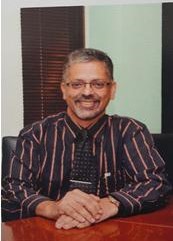
Mr Mohan a/l Selvaraju
Department of Physical and Mathematical Science
Faculty of Science (Kampar Campus)
A brand new experience for me
Mohan glad that his students welcome online teaching and learning as a flexible and self-paced mode of learning. “After many years of face-to-face teaching, online teaching and learning is indeed a brand new experience for me. I am glad to welcome this mode of teaching. Some students are also new to this online learning experience and had their hesitations at first but because of the movement control order (MCO), they had no choice,” Mohan a/l Selvaraju from UTAR Department of Physical and Mathematical Science, Faculty of Science expressed his comment towards online teaching.
He feel glad that now his students welcome online teaching and learning as a flexible and self-paced mode of learning. One of the main challenges that he can think of is the inconsistent internet connection for students. However, with the audio recordings and the links to WBLE, students can do their studies at a later time. Mohan said his students usually communicate with him via WhatsApp, emails or even telephone calls when they have questions. He also would like to advice his students during the MCO period must practice continue learning at home and do not wait till the last minute to do their work.
Online teaching and learning provide excellent flexibility
Dr Cham’s students prefer online learning that can provide them excellent flexibility. “Teaching and learning online is a very relevant method of learning during this period. It offers excellent flexibility and students can learn at their own pace and convenience. This e-learning platform is a great kick-start for our higher education setting, and I think we should embrace these changes for good,” said Dr Cham Tat Huei, UTAR Head of Programme for PhD & MPhil, Faculty of Accountancy and Management.
According to Dr Cham, the students have been responding positively toward this method of teaching in his e-classroom. He has been informed by some of his students that they prefer this method of learning, although some students did encounter difficulties with internet connection but on the whole they enjoy the flexibility. Dr Cham personally think that students should enjoy this learning process as online classes offer materials in different formats that make learning more interesting with the use of technology.
Dr Cham has learnt to combine the use of technologies in my teaching and training since joining as an academic, now he is teaching virtually via internet. From his experience throughout all the online classes, he also learns to adopt more software that can be used to enhance his teaching. This is a great learning curve and everyone should cherish every single moment of it.
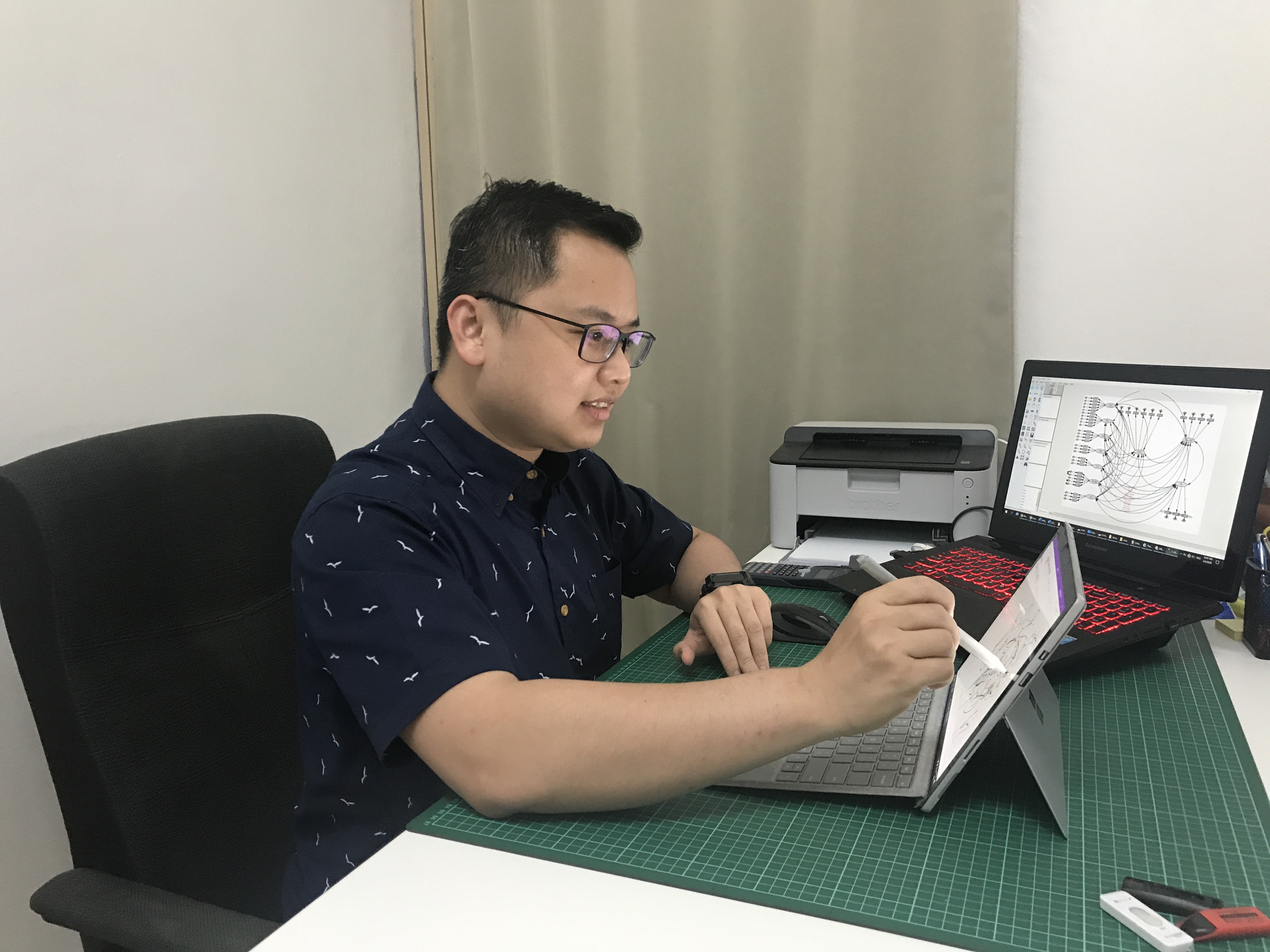
Dr Cham Tat Huei
Head of Programme for PhD & MPhil
Faculty of Accountancy and Management (Sungai Long Campus)

Assoc Prof Dr Cheah Phaik Kin
Department of Public Relations
Faculty of Arts and Social Science (Kampar Campus)
Teaching and learning online is essential for our society
Dr Cheah appreciate online teaching experience which has taught her to be flexible and to embrace technology and explore all that it offers. “The method of teaching and learning online is necessary for our society today. Beyond the MCO situation, it enables inclusivity and self-paced learning. The students were able to cope with the intense use of technology given in the current situation. They were able to adapt very quickly, installing the necessary apps and learning how to navigate the apps rather quickly,” said Assoc Prof Dr Cheah Phaik Kin, Department of Public Relations, Faculty of Arts and Social Science.
Dr Cheah noticed that students become more independent now that there is limited face-to-face access. Even though they could send her a Whatsapp or an email to ask questions, they tend to solve problems more independently if she just gives them some leads. Preparing online lessons are challenging because the materials have to be self-explanatory. Even though students attend online lectures and consultations, the materials must be able to allow students to direct their own learning.
The experience of online teaching is indeed one that is insightful. Dr Cheah reflects on her teaching after each time and think of ways to improve the students' learning experience. She thinks this experience has also taught her to be flexible and to embrace technology and explore all that it offers. This process will never stop. And Dr Cheah has now learnt to enjoy this process of exploration. Everyone may learn from each other - colleagues, students and peers. Students need to learn new ways of collaborating and learning using available technologies. Not only during MCO but beyond MCO, this can open many doors of opportunity for them.
The Gains (and Pains) of e-Learning for UTAR Lecturers

Today we “commemorate” our fifth week of staying home amidst MCO since 18 March. This unprecedented pandemic has certainly made waves all over the world, impacting our work, family life and daily routine, transforming the way we communicate, teach and reach out to our students – all from a distance, from home.
The day before 18 March 2020, I bid farewell to my fellow colleagues, “Do take care in the coming two weeks, soon we will meet again.” But not as soon as we all wished, or anticipated. It went on for two weeks, another two weeks, another two weeks, and another. Will there be more?
We are lecturers, with many or some students under our charge. Professionally, we pride ourselves with the power of knowledge and our (self-proclaimed) lifelong learning skills. So in no time, we scrambled to self-learn some new skills every now and then, or when in desperation we harassed our tech-savvy colleagues with phone calls and WhatsApp to bail us out from technical difficulties, so that our students can complete this trimester with minimal interruption.
The steep learning curve began. We set up remote classes, pre-record our online lecture, insert voice-overs to our existing lecture materials. We learn how to announce Microsoft Teams meeting ID, link, code and password to students before the online classes. We now multitask on our computer, talking and looking out to check the chat boxes to see whether students are asking questions and whether we should attend to the question now, or later. Video conferencing tool (VCT) is our most timely “teacher” prompting us to learn about technological devices with instant learning outcomes – the once unknown practices and unfamiliar 21st century skillsets suddenly become our new reality since we started using VCT in our WFH routine.
Yes, before the MCO, admittedly we were all caught somewhat unprepared for this online venture. We were not used to doing a monologue without having students physically interacting with us. We were not used to talking to our own device or staring at our own image in the computer when delivering our lecture. Despite mastering some online tricks to conduct virtual classes, we felt we were no longer in control in some or most situations. We have lost the “personal touch” with our students – their attentiveness, their group activities and even their distractions (smartphone, non-stop talking, doing own work) in a traditional classroom. We cannot reach out to students in time with our advice, care or personal charisma; nor can we exert any form of influence or control from afar.
As a matter of fact, in the first place we did not even plan to have online classes either “synchronously” (live, at real time) or “asynchronously” (offline, delayed mode). This online teaching is a “quick, ad hoc, low-fidelity mitigation strategy” (Grajek’s viewpoint, quoted in Craig, 2020) for WFH lecturers as a temporary solution to comply with the government’s requirement for social distancing and of course, for our own safety and wellbeing.
Reflecting on the online learning episodes, the burden falls first on lecturers to create and deliver the online materials, lessons, and activities as planned. Lecturers have never been busier. As preparation before class, lecturers plan and design the appropriate interactive activities, prepare the PowerPoint materials and preferably do a recording or voice-over of lectures to be uploaded in the Web-Based Learning Environment (WBLE).
Prior to the online class, lecturers must first set up a meeting ID for students to join. Attendance is taken “creatively” via chat function and participation in quiz. We might recap what was taught last week, get updates on any pending coursework progress; engage students via quizzes, YouTube video, TedTalk, online chat and sharing of useful links, resources and materials. After class, for students who did not attend the class synchronously, we endeavour to upload the recording of the entire online lecture or to contact the students one-by-one via email to know the students’ whereabouts and wellbeing.
Keeping students connected and stay focused during home-based learning using digital tools is never an easy task for the lecture. Remote classes require more attention and engagement as students may get their “device” to attend classes, and not their mind and body. So another challenge for us is to know how students are responding to our ongoing lecture, especially when they choose to stay silent and do not unmute their microphone to talk to us remotely.
Lecturers are getting used to own monologue without any response from students, be it verbal or non-verbal. Hence, in a remote lecture, we are happy to notice how the usually “quiet” students can be responsive via the chat function, e.g. texting questions, responding to a poll and giving feedback. The texting mode seems attractive to students who prefer not to be vocal in class, hence it allows us to connect with students via messages and responses that can be conducive for their learning. The quality of submitted work is still encouraging despite remote learning, which proves that learning outcomes can be achieved if our students remain engaged and interested in the topics we bring virtually.
As we uphold the principles of student engagement and teacher empowerment, our future instructional design shall focus on conducive constructive alignment consisting of course learning outcome(s), learning activities and assessments. We shall plan to conduct future lessons with stimulated interactive class discussion, guiding them towards completion of group or individual assignment to demonstrate intended course learning outcomes.
We have gone through a steep learning curve that is stressful for everyone – lecturers, students, the supporting staff, the faculty and the University at large. The incidents are preparing us for future virtual classes that are well-designed, durable and self-paced towards a more personalised and flexible education. The good news is, we are one step closer to conducting Massive Open Online Learning (MOOC) targeted at learners from all over the world, all walks of life and instructional design considerations are primarily for the convenience of students, instructors, and institutions, without compromising the learning outcomes.
Some hypothetical questions for us to ponder. If the MCO prolongs, are the current learning outcomes still attainable in a remote setting? Are we more resilient towards the uncertainties and changes by now? Are we truly comfortable with the use of digital devices and platforms? Are we more prepared for intensive e-learning online classroom, willingly or reluctantly? Reflecting on the way we are coping with the technological changes, have we truly empowered ourselves with technologies, or idled by them, i.e. without which we cannot teach?
Virtual classroom and remote learning are now a new reality for educators. Looking forward, e-learning is very timely and beneficial to students to develop their digital credentials, to prepare them for future normalcy, i.e. the remote work life and less structured workplace experience that requires better task management and time management skills. As we are now traveling a path less frequented and venturing into an unknown future world, let’s not forget our leadership role to support others emotionally and spiritually, by showcasing our resilience and patience to our loved ones – physically and remotely.
By: Dr Ngeow Yeok Meng Deputy Head, the Curriculum Development and Innovation (CCDI)
Source: Craig, R. (2020). What students are doing is remote learning, not online learning. There is a difference.
Retrieved from https://www.edsurge.com/news/2020-04-02-what-students-are-doing-is-remote-learning-not-online-learning-there-s-a-difference
